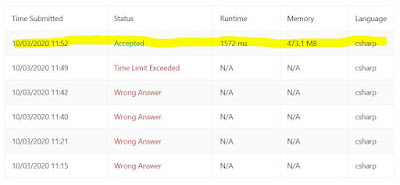A problem worthy of attack, proves its worth by fighting back
These are the famous words by Paul Erdos:
“A problem worthy of attack, proves its worth by fighting back!” – Paul Erdos One of the greatest mathematicians of the 20th Century, Paul Erdos , is often associated with the following rhyme: “A problem worthy of attack, proves its worth by fighting back!”
I'm sure that he was thinking beyond a LeetCode problem :D But this one was worth an attack: https://leetcode.com/problems/alert-using-same-key-card-three-or-more-times-in-a-one-hour-period/
Leetcode company workers use key-cards to unlock office doors. Each time a worker uses their key-card, the security system saves the worker's name and the time when it was used. The system emits an alert if any worker uses the key-card three or more times in a one-hour period.
You are given a list of strings keyName and keyTime where [keyName[i], keyTime[i]] corresponds to a person's name and the time when their key-card was used in a single day.
Access times are given in the 24-hour time format "HH:MM", such as "23:51" and "09:49".
Return a list of unique worker names who received an alert for frequent keycard use. Sort the names in ascending order alphabetically.
Notice that "10:00" - "11:00" is considered to be within a one-hour period, while "23:51" - "00:10" is not considered to be within a one-hour period.
Example 1:
Input: keyName = ["daniel","daniel","daniel","luis","luis","luis","luis"], keyTime = ["10:00","10:40","11:00","09:00","11:00","13:00","15:00"] Output: ["daniel"] Explanation: "daniel" used the keycard 3 times in a one-hour period ("10:00","10:40", "11:00").
Example 2:
Input: keyName = ["alice","alice","alice","bob","bob","bob","bob"], keyTime = ["12:01","12:00","18:00","21:00","21:20","21:30","23:00"] Output: ["bob"] Explanation: "bob" used the keycard 3 times in a one-hour period ("21:00","21:20", "21:30").
Example 3:
Input: keyName = ["john","john","john"], keyTime = ["23:58","23:59","00:01"] Output: []
Example 4:
Input: keyName = ["leslie","leslie","leslie","clare","clare","clare","clare"], keyTime = ["13:00","13:20","14:00","18:00","18:51","19:30","19:49"] Output: ["clare","leslie"]
Constraints:
1 <= keyName.length, keyTime.length <= 105keyName.length == keyTime.lengthkeyTimeare in the format "HH:MM".[keyName[i], keyTime[i]]is unique.1 <= keyName[i].length <= 10keyName[i] contains only lowercase English letters.
We'll do one pass only. The approach was to keep a sorted list of times per name, but for the time you need to convert to decimal (easy: hour*60 + minute). But as you insert a new time, that's when you check whether the alert was triggered. Suppose that you added the new time at index INDEX. There are then 3 cases to check:
Val(INDEX + 2) - Val(INDEX)
Val(INDEX + 1) - Val(INDEX - 1)
Val(INDEX) - Val(INDEX - 2)
Once you do that, then it should work. I made several mistakes along the way, including using a SortedList first when all I needed was a Hashtable. Several attempts later, it worked. Code is below, cheers, ACC.
public class Solution
{
public IList AlertNames(string[] keyName, string[] keyTime)
{
Hashtable nameToTimes = new Hashtable();
List retVal = new List();
Hashtable alreadyAdded = new Hashtable();
for (int i = 0; i < keyName.Length; i++)
{
if (alreadyAdded.ContainsKey(keyName[i])) continue;
int val = Convert24hToNumber(keyTime[i]);
if (!nameToTimes.ContainsKey(keyName[i]))
{
SortedList times = new SortedList(val);
times.Add(val, val);
nameToTimes.Add(keyName[i], times);
}
else
{
SortedList times = (SortedList)nameToTimes[keyName[i]];
times.Add(val, val);
int index = times.IndexOfKey(val);
//Check 2 before index first
if (index - 2 >= 0 &&
(int)times.GetByIndex(index) - (int)times.GetByIndex(index - 2) > 0 &&
(int)times.GetByIndex(index) - (int)times.GetByIndex(index - 2) <= 60 &&
!alreadyAdded.ContainsKey(keyName[i]))
{
alreadyAdded.Add(keyName[i], true);
retVal.Add(keyName[i]);
}
//Check 2 after index next
if (index + 2 < times.Count &&
(int)times.GetByIndex(index + 2) - (int)times.GetByIndex(index) > 0 &&
(int)times.GetByIndex(index + 2) - (int)times.GetByIndex(index) <= 60 &&
!alreadyAdded.ContainsKey(keyName[i]))
{
alreadyAdded.Add(keyName[i], true);
retVal.Add(keyName[i]);
}
//Check the one next to each
if (index + 1 < times.Count &&
index - 1 >= 0 &&
(int)times.GetByIndex(index + 1) - (int)times.GetByIndex(index - 1) > 0 &&
(int)times.GetByIndex(index + 1) - (int)times.GetByIndex(index - 1) <= 60 &&
!alreadyAdded.ContainsKey(keyName[i]))
{
alreadyAdded.Add(keyName[i], true);
retVal.Add(keyName[i]);
}
}
}
retVal.Sort();
return retVal;
}
private int Convert24hToNumber(string time)
{
string[] parts = time.Split(':');
int hours = Int32.Parse(parts[0]);
int minutes = Int32.Parse(parts[1]);
int retVal = hours * 60 + minutes;
return retVal;
}
}




Comments
Post a Comment